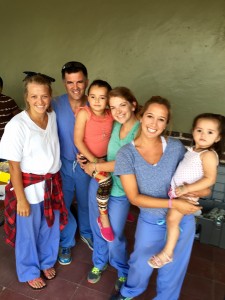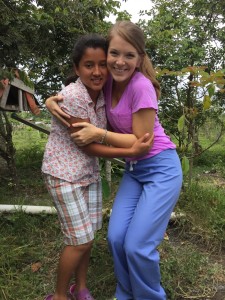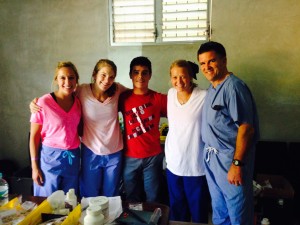OXFORD, Miss. – Boarding the plane to Honduras, Mary Claire Jarrell’s mind raced with emotions and questions: “What will I actually be doing? Will I know enough? Will my Spanish be good enough?” the fourth-professional-year pharmacy student wondered.
Upon landing in the city of San Pedro Sula, the Tupelo resident boarded a school bus with fellow fourth-year students Tate Davis, also of Tupelo, and Christine Hayden, of Birmingham, Alabama. The students were joined by David Gregory, their mentor and associate dean for academic affairs at the University of Mississippi School of Pharmacy.
They traveled four hours to Copan with 23 other volunteers and translators from Global Ministries for a week of medical service to needy people in the Central American nation. Their anxieties and fears were eased upon arrival with every “¡Hola!” and every smile.
With Gregory as the primary pharmacist on the trip, the group charged itself with operating five medical clinics in churches surrounding Copan to serve the medical needs of those who could not afford health care. Davis, Hayden and Jarrell managed the pharmacy process from drug selection to dosage and patient counseling.
On any given day, the pharmacy could see anywhere from 300 to 700 patients. Patients met with a physician or nurse practitioner and then headed to the pharmacy, where the student pharmacists made a clinical decision on what treatments were needed based on the medications in the group’s formulary.
“I was instantly reminded of the importance of communication,” Davis said. “Whether a patient speaks English or Spanish, having them understand how to take their medication is just as important as receiving the medication.”
Gregory, who has led this trip for the past five years, originally met some of his team on a mission trip to Venezuela in the ’90s. Adding his students to the group was a no-brainer, he said.
“To encourage pharmacy students was rather easy, as they wanted to see how the need for health care is so great throughout the world,” Gregory said. “We are better providers when we can serve others who do not have the means to pay us for what we do. We want our students to have a cause greater than themselves. It is never about us; it must always be about the patient.”
During their week in Honduras, the group members served more than 2,000 patients with more than 6,000 prescriptions. While the students realized they could not meet all of the needs of their patients, they were determined to demonstrate their compassion by interacting with all the Hondurans they encountered.
“It was very rewarding to see the students take ownership of the process (of running a pharmacy) and watch them passionately care for the patients and their families,” Gregory said.
The students formed bonds with their patients and the Hondurans working with them. The experience was transformative, Hayden said.
“To say that my life has been changed is an understatement,” she said. “It’s hard to pinpoint one experience that was my favorite or that stood out the most, but it’s easy to say that my favorite part of the trip was the people.”
One of the team members who influenced Hayden was a 17-year-old Copan resident, Antony, who worked as a translator. He attended a bilingual school in Honduras and spoke about his aspirations for medical school.
While days in the pharmacy were busy with crowds of patients, language barriers and Honduran heat, Antony was always smiling and eager to learn. He absorbed as much information as he could and truly enjoyed working with the team.
“Antony was a beautiful reminder of what patient care, including pharmacy, is all about,” Hayden said. “Pharmacy is not about the tests, assignments or meetings; it’s about the patient and how we can impact someone else.
“Antony didn’t even know how much he impacted me, but he did. Just as he told us, no physical gift will ever allow me to forget the gift of meeting Antony, the team we worked with and the people of Copan.”
For Jarrell, her initial worries about the trip were eased by her interactions with a 12-year-old Honduran named Judy, who was the daughter of a pastor from a church that the group visited. She immediately caught Jarrell’s eye with her vivacious spirit as she led songs, played with children and greeted everyone she met.
Though their language barrier was a problem, it was impossible to deny their connection. While working in the clinic a few days later, Jarrell heard “¡Maria Clara, Maria Clara!” through the crowd of people. It was Judy coming to help before going to school.
With the help of a translator, the two formed a bond, and Jarrell trained her to counsel patients and help in the pharmacy. She was eager to learn how to help the people in her community take their medications and aid the pharmacists in any way possible.
“She came as a reminder that our future jobs, profession and training are not just about the medication, interactions and consultations,” Jarrell said. “Our job is about service – not just to serve but to serve well with the eagerness of Judy and to help our local communities by providing the best care we possibly can.”
Davis relished the opportunity to use what she’s learned in the classroom in real-life situations.
“A patient’s health becomes like a puzzle,” Davis said. “To get the best picture, we must put all the pieces, each of our understandings of the patient’s health, together to provide the best care for that person.
“It’s important to put aside the busyness of the world and focus on that one patient. Improving someone’s health is the goal of every prescription filled, every antibiotic dosed and every patient-pharmacist interaction.”


